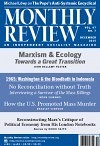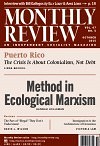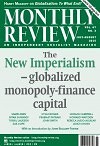Asia

In this issue we feature two articles on the 1965–1966 mass killings and imprisonments in Indonesia. The army-led bloodbath was aimed at the near-total extermination of members of the Indonesian Communist Party (PKI), then a highly successful electoral party with a membership in the millions.… In all, an estimated 500,000 to a million (or more) people were murdered. Another 750,000 to a million-and-a-half people were imprisoned, many of whom were tortured. Untold thousands died in prison. Only around 800 people were given a trial—most brought before military tribunals that summarily condemned them to death.… The United States…was involved clandestinely in nearly every part of this mass extermination: compiling lists of individuals to be killed; dispatching military equipment specifically designated to aid the known perpetrators of the bloodletting; offering organizational and logistical help; sending covert operatives to aid in the “cleansing”; and providing political backing to the killers.… [T]he mass killings…[were carried out with the active] complicity of the U.S. media. | more…
An Interview with Tan Swie Ling on the 1965 Mass Killings in Indonesia
In the early morning of October 1, 1965, self-proclaimed left-wing troops raided the houses of seven top army generals in Jakarta. In the process, six of the generals were killed—three were shot during the kidnapping attempt, while the others were taken to Lubang Buaya, an air force base located in the south of Jakarta, and then killed. The seventh general, Nasution, managed to escape. The perpetrators announced on national radio that they were troops loyal to President Sukarno, and they aimed to protect the president from the danger posed by the right-wing “Council of Generals”—who, they said, were planning to launch a military coup d’état.… This movement was very short-lived. Within one day, it collapsed. Major General Suharto…took control of the army during the morning of October 1 and quickly crushed the movement.… [W]hat happened on October 1, 1965 marked the fall of Sukarno and the rise of Suharto, who was soon to rule Indonesia under his military dictatorship for more than three decades. The brutality of Suharto’s New Order is probably not news for people familiar with Indonesia. But there is “an episode the West would prefer to forget,” as journalist John Pilger put it, that accompanied Suharto’s rise to power: the destruction of Communism and the mass killings that followed—a phenomenon claimed by Time magazine in 1966 as “The West’s best news for years in Asia.” | more…
On October 1, 1965, the teletype in the White House relayed the account of a supposed “coup” by a group of Indonesian army officers calling themselves the September 30th Movement. In Jakarta the movement, which had begun the night before under the alleged leadership of Lieutenant Colonel Untung with the kidnapping and killing of six generals of the Indonesian Army High Command, was already unraveling. The September 30th Movement was a relatively small-scale affair. It was poorly planned and so clumsily executed that it seemed almost preordained to fail. Major General Suharto…took control of the army, and blamed what he labeled a “coup attempt” entirely on the Indonesian Communist Party (PKI). Within two weeks, a much more momentous army-led and U.S.-backed movement to exterminate the PKI and its supporters was under way. Working with Muslim organizations, student groups, and other anti-Communist organizations, the army proceeded over the next five months to murder hundreds of thousands of unarmed, alleged PKI members. The slaughter paved the way for the army’s ouster of Sukarno in March 1966, its ascension to power, and the reconfiguration of Indonesian politics and foreign policy.… The liquidation of the PKI in Indonesia was “perhaps the greatest setback for Communism in the Third World in the 1960s” and an event with enormous implications for each of the Great Powers. | more…
The hard-won lessons of Japan’s wartime defeat are enshrined in its National Constitution and Article 9 in particular.… For the past seventy years, Article 9 remained a fundamental principle of Japanese diplomacy, undergirded by memories of the Asia-Pacific War and the U.S. occupation, buttressed by important revisionist histories of Japanese imperialism. A politically recovered, economically restored Japanese populace still appreciates the Constitution and the relevance of Article 9. But conservative politicians who never believed in the Constitution’s ideals repeatedly challenged and worked around Article 9 despite the majority’s support for it.… Today, once again, Article 9 stands in danger of abandonment by interpretation rather than revision by constitutional processes. | more…
Sven Beckert, Empire of Cotton: A Global History (New York: Knopf, 2014), 640 pages, $35, hardback.
For four years following the 2008 mortgage crisis, I worked as a cotton merchant for one of the “big four” trading firms—ADM, Bunge, Cargill, and Louis Dreyfus. These shadowy giants, two of them privately held, maintain oligopoly control of agricultural commodity markets. From desks in Memphis, my colleagues and I purchased mountains of cotton in Asia, Africa, and the Americas, warehoused it, speculated on it, and sold it back to mills on those same continents.… We sat at the pinnacle of a web of political and economic forces that funneled cotton into facilities we owned and cash into our accounts, but nowhere in the office was there a visible sign of the violence that made it all possible.… Too often liberal histories focus on a single period, territory, or class perspective, and end up obscuring the truth, severing the threads that tie a moment to its historical roots. Sven Beckert’s Empire of Cotton is different. Although a liberal historian, Beckert refuses to limit his scope in the traditional way. Instead, he follows the movement of cotton across time, space, and class, bringing forward the threads that bind the objects of an otherwise distorted past. | more…

Fifty years ago this month, beginning in early October 1965 and extending for months afterwards, the United States helped engineer a violent end to the Communist Party of Indonesia (PKI). Between 500,000 and a million Indonesians were killed by conservative factions of the military led by General Suharto and by right-wing Muslim youth—all with the direct involvement of the CIA, the close cooperation of the U.S. Embassy and State Department, and the guidance of the Johnson administration’s National Security Council.… In forthcoming issues of Monthly Review we are planning to publish work on the Indonesian genocide, which, alongside the Vietnam War, constitutes a major turning point in the history of Southeast Asia in the period, and one of the most brutal acts of mass carnage inflicted by imperialism in the twentieth century. The dire implications of this carry down to the present day. | more…
The Council on Foreign Relations Proposes a New Grand Strategy Towards China
The Council on Foreign Relations (CFR) is the think tank of monopoly-finance capital, Wall Street’s think tank. It is also a membership organization: the ultimate networking, socializing, strategic-planning, and consensus-forming institution of the dominant sector of the U.S. capitalist class.… It is the world’s most powerful private organization, the “high command” body of the U.S. plutocracy. The Council has an almost century-long history of forming study groups to plan the United States’ overall “grand” strategic policies. It sets the agenda for debate, builds consensus among both the powerful and attentive publics, and then inserts its own network of people into public office to implement its favored doctrines in the real world. One of its latest efforts, a study group on U.S. grand strategy toward China, completed its work and issued a report in March 2015—approved by the CFR board of directors—entitled Revising U.S. Grand Strategy Toward China. | more…

May’s Review of the Month, “Honor the Vietnamese, Not Those Who Killed Them” by MR Associate Editor Michael D. Yates, has elicited many responses. One writer said that Yates had written the best, but perhaps the first, Marxist analysis of the war. Another praised Monthly Review for having the courage to publish this article. Still a third predicted that in the more distant future, humanity would embrace the essay’s judgment and honor the Vietnamese people for their heroic struggle against the overwhelming might of the U.S. military.… In light of these comments, as well as the subject matter of this double issue of Monthly Review on imperialism, we thought it might be worthwhile to say something more about what the Vietnamese themselves naturally enough call the American War, with an eye toward drawing important lessons useful for contemporary radicals. | more…
It is now a universal belief on the left that the world has entered a new imperialist phase.… The challenge for Marxian theories of the imperialist world system in our times is to capture the full depth and breadth of the classical accounts, while also addressing the historical specificity of the current global economy. It will be argued in this introduction (in line with the present issue as a whole) that what is widely referred to as neoliberal globalization in the twenty-first century is in fact a historical product of the shift to global monopoly-finance capital or what Samir Amin calls the imperialism of “generalized-monopoly capitalism.” | more…
Lenin, Bukharin, Stalin, and Trotsky in Russia, as well as Mao, Zhou Enlai, and Den Xiaoping in China, shaped the history of the two great revolutions of the twentieth century. As leaders of revolutionary communist parties and then later as leaders of revolutionary states, they were confronted with the problems faced by a triumphant revolution in countries of peripheral capitalism and forced to “revise”…the theses inherited from the historical Marxism of the Second International.… With the benefit of hindsight, I will indicate here the limitations of their analyses. Lenin and Bukharin considered imperialism to be a new stage (“the highest”) of capitalism associated with the development of monopolies. I question this thesis and contend that historical capitalism has always been imperialist, in the sense that it has led to a polarization between centers and peripheries since its origin (the sixteenth century), which has only increased over the course of its later globalized development. | more…
Globalization is not a novel development in the history of capitalism. In his final Monthly Review article, Paul Sweezy argued that globalization is a process, and that it has been occurring for a long time.… The accumulation of capital…has always meant expansion. Furthermore, this very process of growing and spreading is global in scope and, most importantly, imperialistic in its characteristics. Marxist scholars have long argued that imperialism has always accompanied capitalism…. Nevertheless, even if we start with the idea that globalization—or global capitalist expansion—is not novel, this does not trample the argument that the development of such expansion is marked by new characteristics in certain periods. Examining these historically specific characteristics can highlight the imperialistic “nature” of capitalism throughout history, including the development of our current global economy, which will be the focus of this essay. | more…
In this article, we aim to demonstrate that the low prices of goods produced in the global South and the attendant modest contribution of its exports to the Gross Domestic Product of the North conceals the real dependence of the latter’s economies on low-waged Southern labor. We argue that the relocation of industry to the global South in the past three decades has resulted in a massive increase of transferred value to the North. The principal mechanisms for this transfer are the repatriation of surplus value by means of foreign direct investment, the unequal exchange of products embodying different quantities of value, and extortion through debt servicing. | more…


